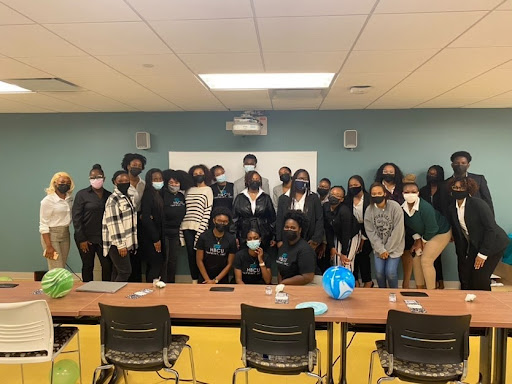
Photo Credits: Gabrielle A. Jackson
Being a first generation college student is one of the leading causes of failure to graduate, according to HBCU Imprint. With only 11 percent of first generation college students obtaining a bachelor’s degree, there is an apparent need to increase efforts to provide them with more academic support. Members of HU Imprint came together to celebrate First Generation Students Day on Nov. 8.
While balancing academic responsibilities in college can become overwhelming for any student, being a first generation student can come with some added pressures. The stress of managing guilt, anxiety or navigating academics may arise. First Generation Students Day aims to highlight the experiences of first generation students while reassuring them that they are not alone in their academic journey.
HU Imprint is Howard University’s branch of HBCU Imprint Incorporated, a non-profit organization that provides mentorship and academic support to first generation students.
A first generation student is defined as a student whose parent or guardian did not graduate with a bachelor’s degree. In other cases, one can be referred to as a first generation student if they are a first generation American, have a parent or guardian that attended college later in adulthood, have a parent or guardian who began college but has not finished, or have a parent or guardian who received a bachelor’s degree but has no involvement in the student’s life.
In an effort to increase the number of first generation college graduates, HBCU Imprint aims to enhance first generation students’ experiences with schooling by providing adequate guidance.
“Our vision is to help eliminate the gap between first-generation students and those who aren’t,” explained Gabrielle A. Jackson, the Founder and CEO of HBCU Imprint Incorporated. “Not only giving them the tools to succeed but showing them how to use them effectively. Creating a new generation of first-generation students with higher graduation rates and a stronger support system.”
According to HBCU Imprint, 25 percent of first generation students drop out after their first year in college. The HBCU Imprint organization emphasizes that this likely can be associated with juggling a lack of assistance in navigating academic responsibilities, little to no mentorship throughout college and familial pressures.
For students like Mya Coon, a sophomore legal communications major and first generation student from Macon, Georgia, there is enhanced pressure to make loved ones proud as the first expected graduate.
“First generation students have stress from academics just like many other students but oftentimes there’s an added layer of pressure,” said Coon. “We are not only working hard for ourselves but for our families. Also, while students who are not first gen usually have someone they can go to for help, we sometimes don’t.”
This added layer of pressure is often what leads to a range of mental health struggles that can complicate the learning process. Some students such as Jackson battled issues such as imposter syndrome, a feeling of not being as competent or intelligent as those around you may think you are, while trying to balance academic responsibilities.
“Succeeding back home was a breeze but at Howard I felt as if those achievements didn’t matter,” said Jackson. “I also had to start working my first semester in college to pay for my non-tuition expenses and textbooks. Registering for classes and staying on course for graduation even now proves to be a huge challenge for myself and students like me.”
While the hardships of first generation students remain prevalent, their experiences have inspired the creation of a day set to honor and celebrate them.
“It’s an acknowledgment of their strength and resilience,” said Jackson. “Celebrating the journey they’re on as they create legacies for the generations to come. First-generation students are breaking generational curses and creating pathways in their communities, that’s definitely something to celebrate!”
For more information on HU Imprint, follow @huimprint on Instagram and @HUImprint on Twitter.
Copy edited by Lauryn Wilson

